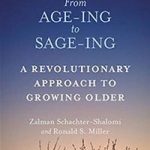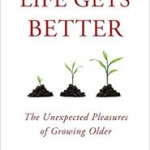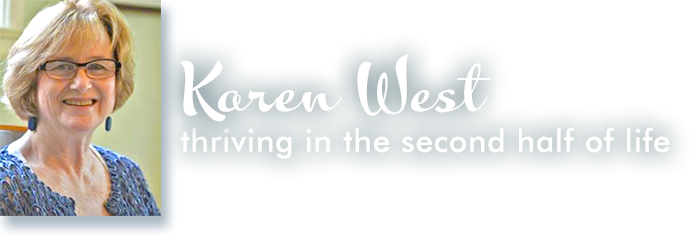 In the book From Age-ing to Sage-ing, Rabbi Zalman writes, “The principal thesis of this book is that extended longevity calls for extended consciousness. If our added years are not matched by an expansion of consciousness, life becomes depressive. If I live to be eighty years old but my consciousness gets arrested at the mental age of forty-five, I stagnate at that level and may suffer from what psychologists call involutional melancholy, a haunting sense of despair that asks the existential question, ‘What is it all for?’ Who needs years, maybe decades of such decline?” (50) I think this quote is a powerful representation of what is happening to so many older people, especially to so many retired people. Participants in my classes often comment that as we have our discussions, they feel energized and empowered. They say that they had been afraid that for all these extra years, they would feel rudderless and useless, that their lives would be without meaning. However, when they’re introduced to conscious aging and sage-ing, they begin to see a whole new way of looking at aging.
In the book From Age-ing to Sage-ing, Rabbi Zalman writes, “The principal thesis of this book is that extended longevity calls for extended consciousness. If our added years are not matched by an expansion of consciousness, life becomes depressive. If I live to be eighty years old but my consciousness gets arrested at the mental age of forty-five, I stagnate at that level and may suffer from what psychologists call involutional melancholy, a haunting sense of despair that asks the existential question, ‘What is it all for?’ Who needs years, maybe decades of such decline?” (50) I think this quote is a powerful representation of what is happening to so many older people, especially to so many retired people. Participants in my classes often comment that as we have our discussions, they feel energized and empowered. They say that they had been afraid that for all these extra years, they would feel rudderless and useless, that their lives would be without meaning. However, when they’re introduced to conscious aging and sage-ing, they begin to see a whole new way of looking at aging.
Later in his book, Rabbi Zalman also writes that “Gerontologists tell us one of the major tasks of old age is to reflect on the wealth of our past experience—our personal achievements as well as our unresolved conflicts—in an attempt to understand what life has meant.” (93) Rabbi Zalman refers to this process as “life review,” and as I’ve said in earlier blog posts, it’s one of the six core topics of sage-ing. Of course, when we tell the participants in our workshops how important life review is, there are always some people who don’t want to– as it is often referred to– “dredge up the past.” I wouldn’t want to do that either. But life review is about so much more. The problem with the way we normally see our lives is that we see them as just a chaotic jumble of experiences. We don’t know how to make sense of it all. It may even feel like a scary, somewhat dangerous thing to attempt. But our seventy-one-year- old self (myself) can come to a much better understanding of what our twelve-year-old self experienced.
 I love that Wendy Lustbader uses a metaphor to describe this experience in Life Gets Better: The Unexpected Pleasures of Growing Older. She says that a “life story” is like an Impressionist painting. We are told that to interpret an Impressionist painting, we have to stand back, because up close, the painting is just “a riot of tiny brush strokes”. Similarily, in our lives there is “a great deal we are unable to discern “while we are still caught up in the small exertions of living.” (124)
I love that Wendy Lustbader uses a metaphor to describe this experience in Life Gets Better: The Unexpected Pleasures of Growing Older. She says that a “life story” is like an Impressionist painting. We are told that to interpret an Impressionist painting, we have to stand back, because up close, the painting is just “a riot of tiny brush strokes”. Similarily, in our lives there is “a great deal we are unable to discern “while we are still caught up in the small exertions of living.” (124)
And Lustbader goes on to say that “Telling stories about a past that has finally been grasped is one of the triumphs of duration. Until we have lived long enough, we do not realize how extensively our recollections get shifted and rearranged over time. The flux arises not so much from revising our memories as revisiting them. We go back and look around with new eyes, each time seeing more of what is there. We infuse what we have learned since into what we did not know at the time, and things begin to make a further kind of sense. With fresh sympathy for those who populate our recollections, the past transforms because we are changing. We know so much more.” (134)
As I thought about this, I remembered a party my twelve-year-old self had. In sixth grade, the most “popular” (such a weighty word at that age) kids started having what we called “boy-girl parties.” I got along fine with the popular kids, but I wasn’t a part of that clique. It occurred to me that I could host a party as an attempt to become a part of their group. Everyone I invited showed up, and we had a great time. Afterward my mother asked me if I thought they would like me more now. I said, “I don’t know, but at least they’ll owe me.” Sadly, I was only invited to one “boy-girl party” after that. As before, I got along fine with the popular kids, but I still wasn’t a part of their clique. All of my life—until I began doing my life review as a part of my sage-ing—my interpretation of that event was that I wasn’t “cool.” Now, however, as I revisit that experience, I think that I was very “brave,” and I’m proud of myself. A much more mature and empowering interpretation.

